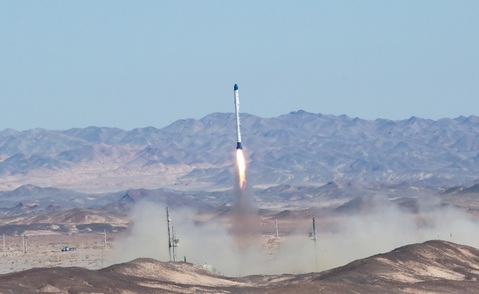Iran's entry into the space club proves that the sky is no longer the limit, added the English-language paper, noting that the satellite made its first contact hours after it entered orbit on Monday February 2, 2015, and is expected to be there for 1.5 years.
Those who took to the streets to oust an American puppet regime back in 1979 never imagined even in their wildest dreams that one day Iran would have a space program and successfully launch satellites into orbit that would also draw considerable attention around the world, underscored the paper in its Viewpoint column.
Much to, what the daily described as the 'dismay of warmongers' on the Capitol Hill and their duped associates, the paper hailed the nation for its success in placing the fourth indigenous satellite into orbit.
Elaborating on the technical aspects of the Fajr satellite in additin to its previous ones, the paper criticized the dominant narrative among Western politicians and in mainstream media that Iran is using its satellite launches as a cover to develop long-range ballistic missile technology.
The same technology used to launch satellites into space can with some modifications deliver conventional and non-conventional warheads over a long distance, it pointed out, adding that nothing however prevents Iran from the perspective of international law from developing long-range ballistic missiles that are capable of delivering conventional satellites.
It is true that the same technology that puts satellites into orbit can also deliver nuclear warheads. The West has every right to be concerned about such tests anywhere in the world, wrote the paper.
This while Western officials have forgotten the fact that Iran does not have nuclear warheads or a nuclear weapons program - as confirmed over and over again by the International Atomic Energy Agency and numerous U.S. intelligence agencies. Therefore, such apprehensions are not genuine or justified at all, stressed the daily.
Undoubtedly, just like its civilian nuclear energy or stem cell research programs, Iran is entitled to master the national technology of launching satellites into orbit - like other developed nations, highlighted the daily.
Subsequently, the so-called Western concerns and threats are not going to discourage the nation’s upward scientific progress in its space program either.
The national space program represents a significant step in the country’s ultra-modern scientific and technological progress, making Iran the first Muslim nation in the world to build and launch state-of-the-art satellites into orbit in order to monitor and aid natural disaster management programs and develop telecommunications, added the paper.
Iran is one of the 24 founding members of the United Nations' Committee on the Peaceful Uses of Outer Space set up in 1959. Under the UN’s mandate, the Islamic Republic will continue to develop satellite technology to reap the strategic and political benefits emanating from the very space presence itself, i.e., self-sufficiency in providing telecommunications and reconnaissance services and breaking into the rank of the world’s most technologically developed nations, wrote the paper in conclusion.
**1425

Tehran, Feb 4, IRNA - Iran prides itself for its ability to conduct a successful launching of its 'Fajr' (Dawn) satellite into orbit that is now transmitting data to its stations on earth, praised Wednesday's edition of 'Kayhan International'.

